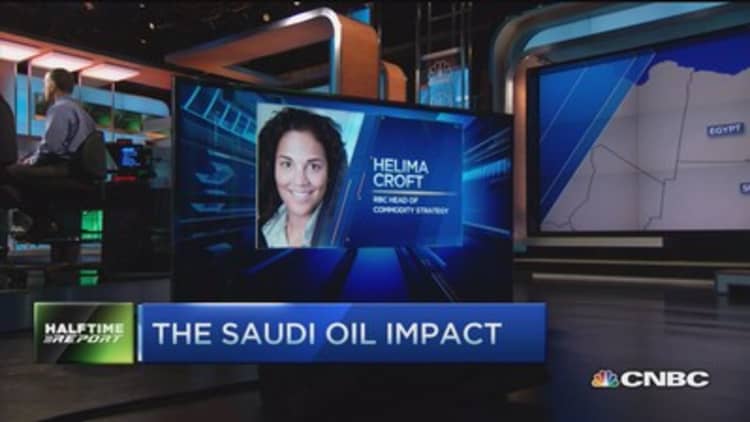There's no one individual who has the power to shake the world oil markets quite like Ali al-Naimi, Saudi Arabia's octogenarian oil minister.
So the replacement of al-Naimi as chairman of state-owned Aramco with its former CEO Khalid al-Falih is being read as a signal by oil traders that he could now be the front runner for oil minister when al-Naimi retires. He was also named to the post of health minister in a series of key appointments by King Salman bin Abdulaziz al-Saud, which included a sweeping succession plan with a new generation in line.
"First of all, al-Naimi, the oil minister, is remaining in his seat, but what's interesting is you now have a new chairman of Aramco. They moved up the former chief executive and people are saying this new chairman could become the next oil minister," said Helima Croft, head of commodity strategy at RBC.

The changes made by King Salman could potentially seal the kingdom's succession for decades. He named his nephew, Interior Minister Mohammed bin Nayef as heir to the throne, and his son, Defense Minister Mohammed bin Salman, as deputy crown prince, now second in line.
Read MoreWhat the Saudi royal shakeup means for oil
King Salman ascended to the throne after the death of his brother, the late King Abdullah, three months ago. Since then, Saudi Arabia has become more aggressive on the foreign policy front, last month launching air strikes in Yemen. Mohammed bin Salman has had a leading role in the Saudi war against Houthi rebels in Yemen, and King Salmon is now further empowering a new generation.
The oil market showed minimal reaction to the news but rallied Wednesday after U.S. government data showed a drawdown in oil supply at the Cushing, Oklahoma, hub. Oil traders, however, were still intrigued by the message being sent by al-Falih's appointment since it is usually the oil minister who chairs Aramco, not the health minister. Another strong candidate for oil minister is said to be King Salman's son, Prince Abdulaziz bin Salman, the deputy oil minister.
Read More
Falih joined Saudi Aramco has been CEO of Aramco since January 2009, and he has not yet been replaced. He has been with the company for more than 30 years, and as CEO he has worked to modernize the company, making it more like its Western rivals.
"He has been the CEO of Aramco, and he's a man of considerable capability and breadth, and he is really respected throughout the oil world," said Daniel Yergin, vice chairman of IHS.
Croft, speaking on "Fast Money Halftime Report" said she believes the changes have more to do with the security concerns the kingdom is facing than its oil policy. She noted the government made a point of announcing the arrest of 93 terror suspects this week.
There is not expected to be a change at the oil ministry through the next OPEC meeting in June, Croft said. Saudi Arabia and al-Naimi have led a campaign to let market forces determine the oil price, not the traditional lever of OPEC output.
At the November meeting, the Organization of Petroleum Exporting Countries held production steady, sending already declining oil prices even lower. Saudi Arabia made it clear it would not cut production unless high cost producers, like U.S. shale drillers, did as well.
The price of oil has been recovering after West Texas Intermediate futures hit a low of around $42 on signs the U.S. industry is slowing down. WTI futures closed 2.7 percent higher Wednesday at $58.58 per barrel, the highest settle since Dec. 11. Brent, the international bench mark, was at about $65.60 Wednesday.
Read More
Croft just returned to the U.S. from Saudi Arabia Wednesday. "Nobody's talking about oil prices being $40 next year. They're talking about a recovery into the $70s," she said, adding the Saudis could have a bigger military budget demand next year.
"I think if the recovery in prices does not come before 2016, that's potentially when there could be a shift in policy," she said.
John Kilduff of Again Capital said the changes in Saudi Arabia appear supportive of the price of oil, which has begun to be more impacted by geopolitical events in recent weeks.
"I think what we're seeing with Saudi Arabia in Yemen is a result of the new generation wanting to move more forcefully," he said. "We're going to see a more robust, active Saudi Arabia in the region.... I think it's supportive of prices, not because of a lack of continuity but a more muscular Saudi Arabia."
Kilduff said he believes there's an $8 to $10 premium in the price of oil due to conflict in the Middle East, a premium that had evaporated earlier in the year.


